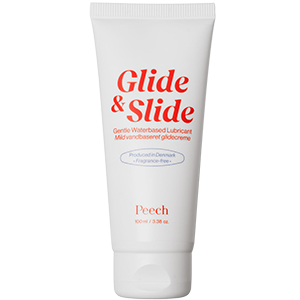The great guide to vaginismus
This article is written by UroGynOb's Physiotherapist, Nanna Møller Nissen, owner of Klinik Krop og Underliv. She works daily with pelvic problems in relation to pain in the abdomen, pain during intercourse, involuntary urination, prolapse and constipation etc. where the conversation about the abdomen and sexuality often go hand in hand.
Can you have a sex life when you suffer from vaginismus?
Vaginismus or vaginismus is a condition where the muscles around the vagina involuntarily contract when attempting penetration, which can make penetrative sex painful or even impossible. This reflex often occurs as a protective mechanism against pain or fear of pain, and can
have deep roots in both physical and psychological factors. As a GynObs physiotherapist, I often work with women who struggle with this condition, and one of the questions I often get is: "Can I have a sex life when I have vaginismus?"
The answer is yes - but it requires patience, understanding, the right treatment and perhaps shifting our assumptions about what a sex life is. Because while the goal for most people is to be able to have penetrative intercourse, it's important to understand that sex is much more than vaginal-penile penetration.
What is vaginismus and what are the symptoms?
Vaginismus is characterized by experiencing pain and difficulty with vaginal penetration - whether with a penis, finger or other object - over a long period of time, despite an expressed desire to have sex. Some may also experience problems with tampon or menstrual cup insertion. In addition to the involuntary muscle contractions, many may experience fear or anxiety about intercourse as it usually involves pain. The fear and anxiety can in itself contribute to further tension in the pelvic floor, which can eventually lead to more persistent pelvic floor problems, lower abdominal pain and deep pain during penetration if intercourse is possible.
Sex is much more than penetration!
Sexuality is much more than just vaginal-penile penetration. It is a broad and diverse spectrum of intimate acts that can involve both physical and emotional connections between partners. Some nuanced aspects of sex that show that intimacy can take many forms such as: kissing, caressing and hugging, having sex with oneself, mutual masturbation, petting, watching porn together or giving each other sensual massages-sex can thus be understood as an intimate interaction between two (or more) people that focuses on pleasure, closeness and mutual respect - and this can play out in many ways beyond penetration. The most important part of sex is often the emotional connection and openness to create mutual pleasure and safety.
This understanding can open up new aspects of their own sexuality for many with vaginismus, which can be a good place to start as trust and safety are an essential part of treatment.
How does vaginismus affect sexuality?
Repeatedly experiencing pain during intercourse can create fear, which in turn leads to avoiding sex altogether. This can result in decreased desire, decreased libido and psychological barriers. Many vaginismus sufferers also withdraw from other forms of intimacy, as described above, for fear that their partner will initiate intercourse, which can create further distance in the relationship.
How can a GynObs physiotherapist help?
As a physiotherapist specializing in urology, gynecology and obstetrics, I help reduce tension in the pelvic floor muscles and help my clients rediscover their sexuality in a safe and controlled way. The treatment is based on a multifactorial approach, but in short,
aims to reduce the sensitivity of the pelvic floor muscles, which can be done in several ways:
- Manual treatment:
A GynObs physiotherapist can manually treat tense and sore pelvic floor muscles. - Using dilators, pelvic wands and vibrators:
These products help to gradually accustom the body to touch and penetration in a gentle way. Choose a product that you feel comfortable using. -
Lubricants:
Can reduce friction and increase comfort during sexual activities.
- Relaxation exercises:
Helps reduce muscle tension in the pelvic floor. You can find exercises for pelvic pain HERE - Talk therapy:
Focus on stress and psychological factors that often play a role in vaginismus. - Sensuality training:
Focus on intimate actions such as applying creams or oils, taking a bath with a focus on the senses around soaping/drying yourself etc. or massage with a partner without leading to penetration intercourse. - Holistic treatment:
Sexuality is closely linked to both physical and mental health, and treatment therefore includes a general attention to the whole body. - See leaflet with relaxation exercises for lower abdominal pain HERE
The road to a healthy sex life
Many people struggling with vaginismus can achieve a healthy and satisfying sex life with the right treatment. But, as mentioned, it requires patience, understanding, the right treatment and possibly getting to know your body all over again. Talking openly with your partner is also an important part of treatment, as safety and trust play
a key role in restoring intimacy. If you experience symptoms of vaginismus, it's important to take the first step towards help. Talk to your doctor/gynecologist about any hormonal changes or pelvic disorders, and get in touch with a GynObs physiotherapist who can help you work on your pelvic floor muscles and rediscover your sexuality in a safe way.
Remember that sex is about pleasure and intimacy - and there are many ways to enjoy intimacy, even without penetration.
Sources:
- Vaginismus: A review of the literature on the classification/diagnosis, etiology and treatment.
- Pain and sexuality: A study of how chronic chronic chronic pain affects women's sexuality (2019-10-26_SEXUS-rappor...).
Read also blog posts about breathing or how to have sex without penetration.





